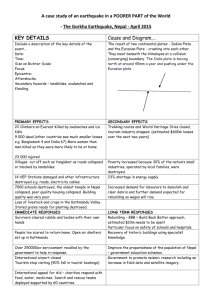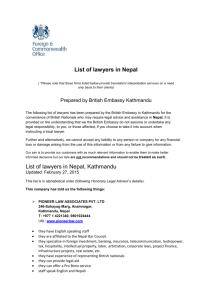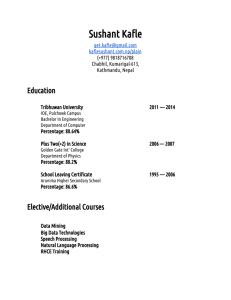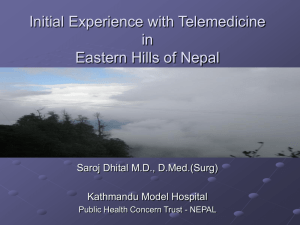(AF) in Kathmandu, Nepal - Human Rights Lawyers Association
advertisement
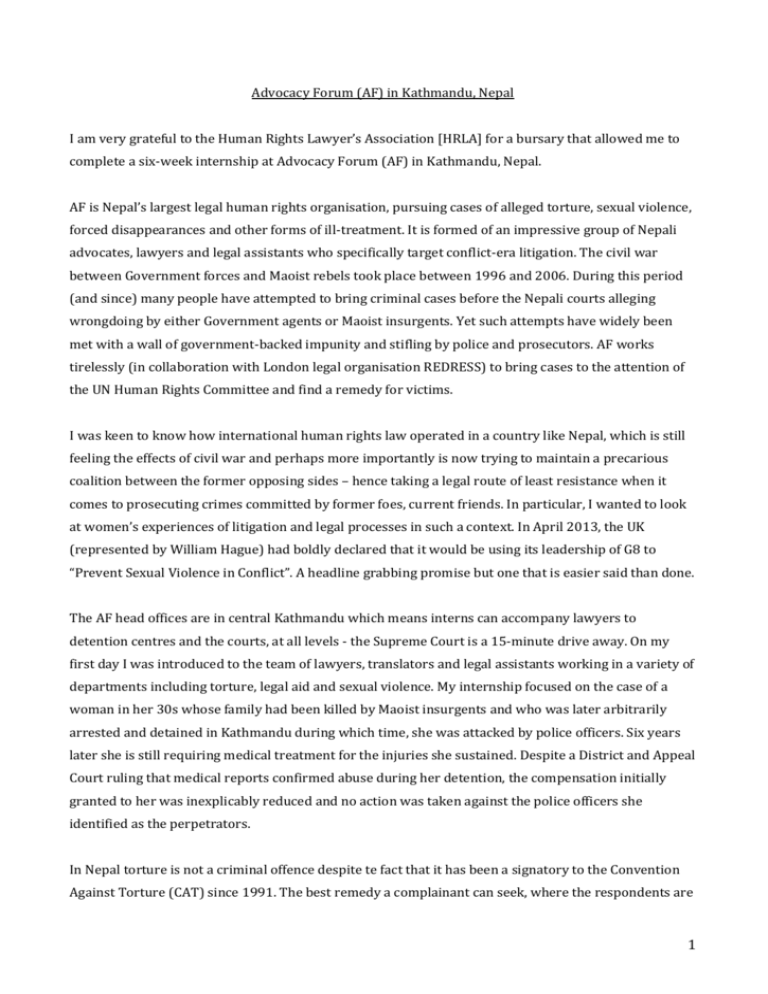
Advocacy Forum (AF) in Kathmandu, Nepal I am very grateful to the Human Rights Lawyer’s Association [HRLA] for a bursary that allowed me to complete a six-week internship at Advocacy Forum (AF) in Kathmandu, Nepal. AF is Nepal’s largest legal human rights organisation, pursuing cases of alleged torture, sexual violence, forced disappearances and other forms of ill-treatment. It is formed of an impressive group of Nepali advocates, lawyers and legal assistants who specifically target conflict-era litigation. The civil war between Government forces and Maoist rebels took place between 1996 and 2006. During this period (and since) many people have attempted to bring criminal cases before the Nepali courts alleging wrongdoing by either Government agents or Maoist insurgents. Yet such attempts have widely been met with a wall of government-backed impunity and stifling by police and prosecutors. AF works tirelessly (in collaboration with London legal organisation REDRESS) to bring cases to the attention of the UN Human Rights Committee and find a remedy for victims. I was keen to know how international human rights law operated in a country like Nepal, which is still feeling the effects of civil war and perhaps more importantly is now trying to maintain a precarious coalition between the former opposing sides – hence taking a legal route of least resistance when it comes to prosecuting crimes committed by former foes, current friends. In particular, I wanted to look at women’s experiences of litigation and legal processes in such a context. In April 2013, the UK (represented by William Hague) had boldly declared that it would be using its leadership of G8 to “Prevent Sexual Violence in Conflict”. A headline grabbing promise but one that is easier said than done. The AF head offices are in central Kathmandu which means interns can accompany lawyers to detention centres and the courts, at all levels - the Supreme Court is a 15-minute drive away. On my first day I was introduced to the team of lawyers, translators and legal assistants working in a variety of departments including torture, legal aid and sexual violence. My internship focused on the case of a woman in her 30s whose family had been killed by Maoist insurgents and who was later arbitrarily arrested and detained in Kathmandu during which time, she was attacked by police officers. Six years later she is still requiring medical treatment for the injuries she sustained. Despite a District and Appeal Court ruling that medical reports confirmed abuse during her detention, the compensation initially granted to her was inexplicably reduced and no action was taken against the police officers she identified as the perpetrators. In Nepal torture is not a criminal offence despite te fact that it has been a signatory to the Convention Against Torture (CAT) since 1991. The best remedy a complainant can seek, where the respondents are 1 state agents such as the police or army, is compensation and departmental action. In this case, the remedy of departmental action had been refused on the basis that it was not sufficiently clear there was enough evidence against the individual respondents - the obvious Catch-22 being, that without an independent inquiry, there never will be enough evidence. I was given translated versions of all the witness statements, the petitions AF had submitted on the Claimant’s behalf, first to the District Court and then to the Court of Appeal in November 2012, as well as the judgments handed down by both of those courts. It was interesting to see how cursory the judgments were (a couple of pages maximum), compared to what we expect from the UK legal system when faced with such a serious allegation. I was asked to use the information in these documents to compile a petition to the UN Human Rights Committee in an attempt to have her case reviewed under international law. I have never been formally taught international law (it is not one of the modules of the GDL and my first degree is in history), so this internship gave me the opportunity to learn and apply the legal provisions in UN treaties in a way that really brought home what a vital role it plays as an avenue of recourse where domestic contexts appear to be letting victims down. I used the provisions of the International Covenant on Civil and Political Rights (ICCPR) to decide which Articles may have been violated by the Nepali state in its handling of this case. Petitions to the HRC are the key (and often only) chance to put the case as forcefully and persuasively as possible but it isn’t just about telling the ‘story’; all alleged violations need to be backed up with comprehensive references to the ICCPR, UN jurisprudence and confirmation that these references apply to Nepal. On top of this, it aids the case to refer to a number of human rights reports on Nepal by authorities such as UN Special Rapporteurs or organisations such as Human Rights Watch. Therefore much of your time is also spent trawling the internet for any supporting documents. In just six weeks I learnt so much, not only about international law and how to draft a persuasive legal document but also how an internship at a human rights NGO like AF can immerse you in a country with a completely different human rights and legal culture to the UK and show you how to adapt the legal training you have to different demands. It can also show you that there are both rewards and frustrations in such work. On a practical level your working day suddenly revolves around power black-outs (“load shedding”), bad weather, earthquakes, transport strikes across the city and intermittent internet. Documents take time to come through because they need to be translated, medical reports may not be as comprehensive as you hope and you need a translator yourself to follow any court proceedings. Nepali courts are very strict (much stricter than ours) on speaking, so this often amounts to a few scribbled notes to give you the basics. 2 Despite the frustrations, the rewards are immense. It is a rare chance to practice law in a country undergoing political and legal uncertainty. While I was in Kathmandu there were daily strikes known as “bandhs” relating to political corruption and the coming election, which means all traffic systems shut down, all shops close and you are advised not to go out. The daily news and talk in the back streets is filled with incidents we would never come across in the UK – witchcraft killings and torture in the hillsides and hunger strikes by parents whose children were killed by Maoist insurgents, filled both column inches and ‘taxi chat’. With such a backdrop I think you can’t help but feel more acutely the force and importance of the law in building reliable legal structures which change day-to-day lives and make you realise why you do it. Naomi Loomes. 3

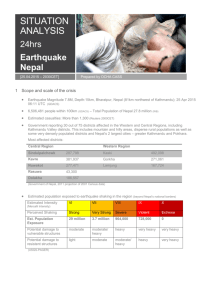

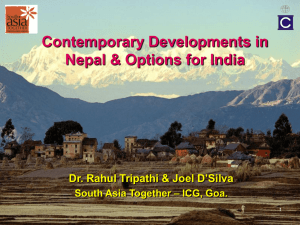
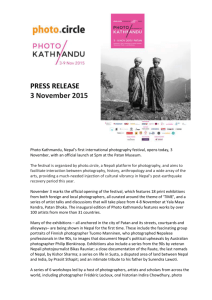
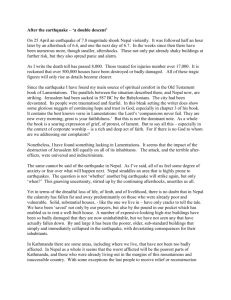
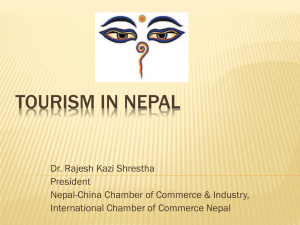
![goodorbaddoc[2].](http://s3.studylib.net/store/data/007716732_2-c358dd078f9663c053518be34422f53d-300x300.png)
